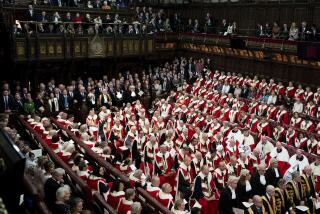EUROPE : Heavyweight MPs Leaving Political Ring : British retirees represent the last links to the World War II giants of government.
- Share via
LONDON — In addition to the possibility of voting in fresh national leadership, next month’s British elections will mark the retirement of a record number of members of Parliament, including some of the heavyweights of British politics.
The departures will make room for new blood in the Commons this year--but also will sever Parliament’s last ties to that older generation of lawmakers who were the World War II giants, such as Winston Churchill.
Those MPs sounding their farewell to political arms are led by Margaret Thatcher, 66, first elected to the north London constituency of Finchley 32 years ago and the longest-serving British prime minister in this century.
Britain’s first woman head of government--she led the Conservative Party to three election victories beginning in 1979--was deposed by her own party MPs in November, 1990, and succeeded by John Major, who faces a tough fight in the April 9 balloting.
Departing the House of Commons along with Thatcher is former Labor Party leader Michael Foot, 78, first elected in 1945, who is known as a great orator but whose left-wing campaign manifesto in 1983 was described as “the longest suicide note in history.”
Foot will be accompanied by former deputy Labor leader Denis Healy, 74, a master debater often called “the best leader Labor never had.” He was passed over for the party leadership because of his fierce opposition to Labor’s left wing.
Also leaving is David Owen, 53, who in a Labor government was the youngest foreign minister since Anthony Eden. He bolted the party to form the Social Democrats and led them from 1983 to 1990 in an unsuccessful attempt to “break the mold of British politics.”
Going, too, is Cyril Smith, 63, for 20 years a spokesman for the Liberal Party, which later merged with what remained of the Social Democrats.
Also departing are 27 Tory MPs who have been ministers or junior ministers at some stage of their careers. The best known are Geoffrey Howe, 65, ex-foreign minister and deputy prime minister, and Nigel Lawson, 60, chancellor of the exchequer from 1983 to 1989.
Howe and Lawson were major supporters of economic Thatcherism--favoring tax cuts and privatization of industries--but clashed with her over their support for closer monetary links to the European Community.
Their resignations from the Cabinet and resultant criticism of their leader were key reasons for Thatcher’s downfall as prime minister.
Two other departing ex-ministers, John Wakeman, 59, and Norman Tebbit, 60, were survivors of the IRA terrorist bombing at Brighton in 1984 that almost killed Thatcher and her ministers. They remained loyal to her to the end.
Another outgoing former minister, Cecil Parkinson, a Thatcher favorite, was forced to step down from the Cabinet when his pregnant secretary revealed their 12-year affair.
Ian Gilmore, 65, was the leading Cabinet dissenter in Thatcher’s early years and was eventually fired, while Nicholas Ridley, 63, had to step down when his anti-German remarks were published.
Remaining in Parliament is Edward Heath, 75, who is the only ex-prime minister serving in the House of Commons and who, if reelected, will become “father of the House,” or senior member, having been first elected in 1950.
Almost all those leaving who have served for 20 years or more can expect knighthoods or peerages. So the betting is that a dozen or so of the retiring MPs, those honored with peerages, will remain in Parliament--to sit this time in the House of Lords.
More to Read
Sign up for Essential California
The most important California stories and recommendations in your inbox every morning.
You may occasionally receive promotional content from the Los Angeles Times.













